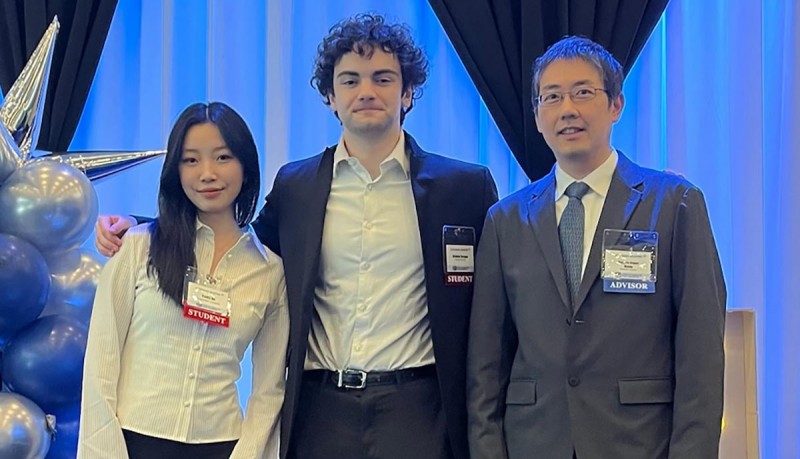Watson College students compete in Ethics in Engineering Competition
The event asks participants to find solutions to complex engineering, business and ethical challenges

Mechanical engineering students Nicholas Sprague ’25 and Emily Xu ’25 represented Binghamton University in this year’s Ethics in Engineering Competition, accompanied by Associate Professor Peter Huang.
Lockheed Martin — a leading company in advanced technology systems, products and services in the aerospace and defense industry — welcomed students from colleges and universities all around the United States to Bethesda, Maryland, for its Eighth Annual Ethics in Engineering Competition.
The event asks participants to find solutions to complex engineering, business and ethical challenges. This year’s competition centered around the ethics of using artificial intelligence (AI) to fight wildfires and to consider how the utilization of such technologies can enhance the accuracy of decision-making during wildfire management.
“The debates were about AI, how reliable it is over human judgment and any risks of bias that are involved in its use,” Sprague said.
Teams worked to develop a firefighting intelligence solution that met customer needs by balancing technology use with critical human input. The goal is to demonstrate their critical thinking, problem-solving and collaboration skills.
Three judges listened to each team’s pitch and decided the winner of each round. Students were randomly assigned a stance to take when presenting.
“I think the hardest part was that we had to be fully confident on either the human or AI side. There was a really broad scope of research that we had to do to prepare,” Xu said.
Sprague and Xu advanced to the final 16 teams.
“They did great,” said Huang, who is the director of the Thomas J. Watson College of Engineering and Applied Science’s Engineering Design Division. “They did the best Binghamton has ever done. I think that speaks to their preparation. They worked hard to prepare for it.”
Throughout the two-day event, students had the opportunity to engage with Lockheed Martin engineers, participate in workshops and explore emerging issues in artificial intelligence. They also experimented with Lockheed Martin simulators.
A live video call with astronaut Suni Williams from the International Space Station was among the highlights of the event.
The students also had the chance to tour institutions around Washington D.C., including the Smithsonian Air and Space Museum, Lockheed Martin’s Global Vision Center and the Global Emergency Operations Center.
“Lockheed Martin made sure everyone felt their time there was worth it, whether you advanced far in the competition or not,” Huang said.
Reflecting on their experience, Sprague and Xu appreciate the opportunity to display and advance their skills in a real-world setting. They want to encourage students to step out of their comfort zone and participate in activities that Binghamton presents.
“Even if you don’t see yourself doing it, there is something you definitely won’t regret doing,” Xu said.

